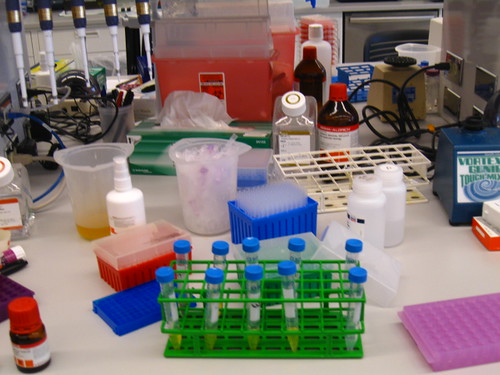
Image : http://www.flickr.com
Forensic science technicians investigate crimes by collecting and then analyzing physical evidence found at the crime scene. They often specialize in areas such as DNA analysis or firearm examination, performing tests on weapons or on substances such as fiber, glass, hair, tissue, and body fluids to determine their significance to the investigation. Proper collection and storage methods of evidence are important to protect their validity. They also prepare reports to document their findings and the laboratory techniques used, and also provide valuable information and expert opinions to investigators.
When criminal cases come for trial, forensic science technicians often testify, as expert witnesses, on specific laboratory findings by identifying and classifying substances, materials, and other evidence collected at the scene of a crime. Some forensic science technicians often work closely with other experts or technicians. A forensic science technician may consult a medical expert about the exact time and cause of a death or a technician who specializes in DNA typing in hopes of matching a DNA type to a suspect.
Most employers prefer applicants who have at least two years of specialized training or associate degrees in applied science or science-related technology. Others prefer applicants with bachelor's degrees in chemistry, biology, or forensic science. Career preparation in forensic science is also available through two year formal training programs that combine the teaching of scientific principles and theory with practical hands-on application in a laboratory setting with up-to-date equipment. Science technicians must have strong communications skills and should be able to work well with others. Excellent organizational ability, an eye for detail, and skill in interpreting scientific results are also important. Technicians usually begin work as trainees in routine positions, under the direct supervision of a scientist or an experienced technician. As they gain experience, they take on more responsibility and carry out assignments only under general supervision, and some eventually become supervisors.
On a typical day, a forensic science technician might perform some of the following duties - examine, test and analyze tissue samples, chemical substances, physical materials, and ballistics evidence, using recording, measuring, and testing equipment; interpreting laboratory findings and test results to identify and classify substances, materials, and other evidence collected from the crime scene; collect and preserve criminal evidence used to solve cases; confer with ballistics, fingerprinting, handwriting, documents, electronics, medical, chemical, or metallurgical experts concerning evidence and its interpretation; reconstruct the crime scene to determine relationships among pieces of evidence; prepare reports or presentations of findings, investigative methods, or laboratory techniques and even testify as expert witness on evidence or laboratory techniques in trials or hearings.
Forensic Science [http://www.e-ForensicScience.com] provides detailed information on Forensic Science, Forensic Science Degrees, Forensic Science Colleges, Forensic Science Schools and more. Forensic Science is affiliated with Biotechnology Careers.
No comments:
Post a Comment